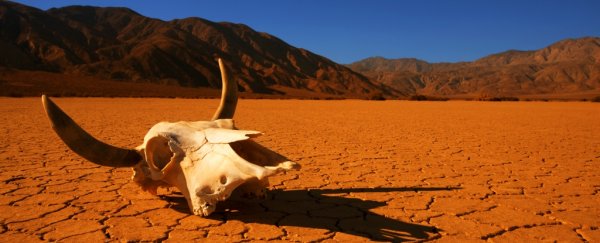The Gryphon discusses the recent surge of global action to combat climate change and whether we are acting fast enough…
The Living Planet Report by WWF estimates that 60% of mammals, birds, fish and reptiles died out between 1970 and 2014. This shocking figure reveals the catastrophic damage caused to wildlife by humans leading WWF to call for urgent global commitment in order to halt this decline and tackle deforestation, climate change and plastic pollution. Pressure from campaign groups and the wider public builds (governments, businesses, communities and individuals) are facing a louder call than ever before to change their behaviour and contribute to making a difference.
Humans have been responsible for the decline of animal populations long before 1970. Research published in the Proceedings of the National Academy for Sciences estimates that in total 300 species of mammal have gone extinct as a result of human activity. This fact is not just tragic because of the individual species involved which will never again be seen on this Earth. Scientists believe that extinctions caused by people prior to 1500 AD represent the removal of 2 billion years of evolution and that since 1500 AD a further 500 million years of evolutionary history have been wiped out. The phylogenetic tree, representing the emergence of species and their evolutionary interconnections through natural selection over millions of years, is being broken apart branch by branch. Even if our species were to bring pollution, deforestation and waste production down to natural levels, scientists estimate it will take 5-7 million years for the ecosystem to recover.
But this recent research has brought home the imminent and critical threat to wildlife posed by humans in 2018; and alarmingly, as things are, the trend is set to continue unabated. The biggest cause of wildlife decline is the destruction of natural habitats; in central and southern America, deforestation is responsible for wiping out 89% of vertebrate population. Much of this destruction takes place to make room for farmland; especially for soybeans, the product of choice for many countries looking for cheap animal feed for pigs and chickens. Incredibly, in the Brazilian Cerrado forests, an area the size of Greater London is cleared every two months for agriculture.
With such dire warnings about, and a growing sense that time is running out, the international community may be looking for the world’s richest and most powerful nation to set a good example. However, there are widespread fears amongst environmental campaigners that the current U.S. administration is not taking the problem of wildlife decline, and other environmental issues, seriously enough.
Donald Trump’s decision in June 2017 to pull out of the Paris climate agreement gained widespread attention. The Agreement had aimed to get participating countries to limit global warming below 2C by 2030, and there were fears that Trump’s move would reduce its legitimacy. Since then, however, we have learned that the 2C target does not go far enough, and that if we want to limit rising sea levels, reduce the occurrence of heat waves, retain as much Arctic sea ice as possible and prevent the total disappearance of coral reefs, governments must stick to the revised figure of 1.5C.
Despite the apparent urgency of the situation, officials in the Fish and Wildlife Service, working in the Trump administration, are being accused of advancing economic interests to the detriment of the Endangered Species Act – the most important U.S legislation for the protection of wild animals under threat. The officials are seeking to reduce transparency in their department to protect their work from ‘public scrutiny’ and damaging effects to government court cases. Campaigners believe this will further prevent the public from standing up to inadequate measures for tackling the decline of animal populations.
There is, however, a concerted international effort to turn the tide on wildlife decline. Recently, the U.K. government has backed a proposal by the Commission for the Conservation of Antarctic Marine Living Resources (CCAMLR) to establish the worlds biggest marine wildlife protection zone in Antarctica. The reserve, planned to be 1.8 million square km or five times the size of Germany, aims to protect vulnerable species such as Orca, penguins and Leopard Seals from fishing and hunting. There is reason to be hopeful that the CCAMLR will achieve success, as reports from their last annual meeting show that cases of seabird mortality and illegal fishing in their other protected areas have reached a record low.
Individual countries are now taking significant steps towards decreasing the impact of people and industry on nature and the environment. In an attempt to combat plastic pollution, the environment secretary, Michael Gove, has committed to a ban on plastic straws, drink stirrers and cotton buds by 2019. This comes after the EU proposed similar measures, showing international cooperation on a clearly pressing environmental issue. Currently, one million seabirds and over 100 000 marine mammals die every year from eating or getting caught in plastic waste, so these governmental commitments are welcomed by campaigners. In Canada, Justin Trudeau has promised to fulfil his 2015 campaign pledge with a new carbon tax, which will charge $50 per ton of carbon emitted by 2022.
Environmental agencies and campaign groups have lobbied governments and businesses for years to change their practices in order to protect animals and the environment. There is a sense, though, that as the warnings of scientific research get more and more grave, and the wider public agitation for change increases in this age of social media, shown by the American public protests over Trump’s decision to pull out of the Paris Agreement, that authorities are having to act. With the clock ticking, and saddening evidence of our impact on nature being presented every day, the concern must surely be whether enough is being done and done with enough urgency to tackle such an enormous and fast-moving problem.
Tristan Griffith

